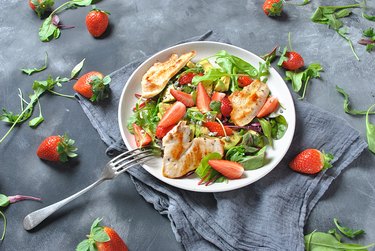
We've all lived this scenario: You head out for a night of fun with friends and, despite your best intentions, you eat the burger. And the fries. And the milkshake… Even if there's no alcohol involved, you still wake up the next morning feeling groggy, bloated and battling a headache. What gives?
That's a food hangover, or a group of symptoms that feels similar to a regular hangover, but was induced by overeating.
Video of the Day
Video of the Day
Here's what you need to know about food hangovers, including how to nurse one — and a dietitian's tips for avoiding one in the future.
What's a Food Hangover?
A food hangover happens when you eat more than you normally would, or after you've eaten foods you usually wouldn't eat, due to a social gathering, holiday dinner, work party or other event where no healthy foods were available. Or perhaps there were healthy foods available, but you opted for richer foods due to the social environment.
"A food hangover is a phrase used socially to describe unpleasant symptoms that occur after eating in a more gluttonous fashion than your norm," Keeley Mezzancello, RD, LD, a certified health and wellness coach, tells LIVESTRONG.com.
Physical symptoms of a food hangover include digestive discomfort, such as bloating, heartburn, abdominal pain, cramping, gas and constipation, as well as fatigue, low energy and sluggishness.
The mental and emotional aspects of a food hangover vary from person to person, but overeating often comes with symptoms such as guilt, shame, self-consciousness and feelings of failure. In most people, Mezzancello says, food hangover symptoms present as a combination of both mental and physical factors.
What Not to Do for a Food Hangover
Let's start with the don'ts of dealing with a food hangover, so we can stop any self-sabotage in its tracks.
1. Shame Yourself
The first step to overcoming your food hangover is — this probably won't come as a shock — to not feel ashamed or guilty. Of all the dos and don'ts, this one might be the most difficult to stick to, especially when diet culture tells you it's bad to enjoy yummy food, per the National Eating Disorders Association.
You probably already feel bad physically — you don't want to make yourself feel bad emotionally at the same time. Don't label the food you ate as "good" or "bad" and avoid weighing yourself or engaging in other activities that might make you feel unhappy about your body.
2. Starve Yourself
You might think that fasting is going to help reset your body after you overate. While intentional, well-planned fasting can have health benefits, starving yourself the day after overeating isn't a great way to deal with physical or emotional symptoms.
Skipping meals — especially if you wait until you're severely hungry — can lead to overeating again when you finally allow yourself to have food.
Instead, stick to your normal meal schedule and make sure to include lean protein, Mezzancello says, and when possible, cook or prepare food at home. This can help you monitor what you eat, so you don't accidentally exacerbate the physical symptoms of a food hangover (more on that later).
"Cut yourself some slack and move on. Healthy eating is not perfect eating — there is no such thing."
3. Try a "Cleanse"
Unless you're strong-willed and genuinely love vegetable juice, this approach probably won't do much for you. Cleansing because you feel the need to "purify" or "remove toxins" might contribute to an unhealthy, all-or-nothing mentality. Instead, Mezzancello encourages you to resume your normal routine.
"It's what we do most of the time that really matters for our overall health, not what we do every so often," she says. " So whether you over-indulged at a party, tailgate or while dining out, use your next eating opportunity to 'resume your normal programming' and get back to your routine."
Embracing a "falling off the wagon" mentality can cause you to emotionally charge your food, which can lead to cycles of deprivation, overeating and guilt, Mezzancello says.
4. Compulsively Exercise
This follows the same principle as cleansing: Exercise done out of guilt, shame or feelings of failure will only result in a vicious cycle. You should exercise because you want to feel good, not because you feel bad about what you ate. Stick to your normal workout routine or even do something easier than usual, like taking a walk instead of lifting weights, if your body doesn't feel up to a tough workout.
5. Feel Defeated
One night of overeating will not ruin any health or fitness progress you've made. In fact, treats are an important part of any health journey. Your food hangover should re-motivate you to reach your health goals, not encourage you to give up.
Instead, use a food hangover as a teachable moment, Mezzancello says. Tell yourself something like, "Hey, I really do feel better when I eat healthy, versus how I feel right now" to reinforce your regular healthy habits.

How to Actually Nurse a Food Hangover
Now that you know what not to do after you eat a bit too much, let's talk about what you should do.
1. Forgive Yourself
You can't change what has already happened. So take it in stride, and own it. Understand why it happened and make a mental note; then, get on with your day (and breakfast, if you're hungry).
"Cut yourself some slack and move on," Mezzancello says. "Try to treat yourself the way you'd treat a loved one. Healthy eating is not perfect eating — there is no such thing."
2. Get in a Good Workout
Notice this tip says to get a "good" workout, not an "obligatory" workout. Do something you love. Don't slave away on the stair-stepper for an hour if you don't want to — get your body moving and thank it for all it does.
"Exercise can help you feel your best both mentally and physically, so aim for at least 30 minutes of whatever exercise you enjoy," Mezzancello says. Use this time to appreciate your body, rather than succumbing to self-pity.
Plus, a food hangover is the perfect time to see what a little extra fuel (read: carbs) can help you do! If your body isn't used to exercising after large meals, you might be surprised that you can run faster and lift heavier when you have extra fuel to utilize.
3. Hydrate Properly
Your body is probably begging for water. If you aren't accustomed to eating a lot of salt or sugar in one sitting, you're likely a little dehydrated. Water will help all that food move through your body properly and eliminate any false hunger cues.
Mezzancello says you should aim to drink at least half of your body weight in ounces of water. For example, if you weigh 150 pounds, you should drink at least 75 ounces of water. If you exercise, drink even more.
In a year, you won't look back at photos and think, "I can't believe I ate so much that night." You'll look back and think, "I remember how fun this night was!"
4. Eat Foods That Will Make You Feel Good
To quiet your body's revolt against last night's dinner, focus on colors — that's where the nutrients are! Foods that have naturally deep hues of red, orange, green, purple, blue and yellow contain tons of essential vitamins and minerals (and water!) that will help your body kick back into gear.
"Include potassium-rich food like avocados, bananas, sweet potatoes and leafy greens to reduce bloat," Mezzancello says, "while limiting saltier foods like soups, fast food, cheese and condiments."
5. Focus on the Positives
Most of the time, people indulge in rich foods at social gatherings. What were you doing when you overate? If you were spending time with family or friends, allow the fun of the get-together to outweigh the hangover. In a year, you won't look back at photos and think, "I can't believe I ate so much that night." You'll look back and think, "I remember how fun this night was!"
But you don't have to wait an entire year to reminisce on the good times. Shift your focus from the negative to the positive by jotting down a few things you loved about that event. For instance, maybe you reconnected with an old friend or made up an inside joke that'll last a lifetime. This trick will help you forget about any feelings of food-related guilt or shame.
How to Prevent a Future Food Hangover
Mezzancello says that planning is essential to prevent unintentional overeating, and thus essential to prevent a food hangover. For example, if you find yourself with a food hangover on most Saturdays, consider what you did on Friday and make a plan to succeed next time.
Here are some tips from Mezzancello to help prevent a food hangover after your next social event:
- Don't skip meals during the day just because you know you have an outing later — this usually backfires because you're over-hungry and, at the event, are surrounded by rich and alluring foods.
- Have a snack with protein and fiber prior to the event to take the edge off your appetite. A quarter-cup of nuts, yogurt and berries, or a piece of whole-grain toast with nut butter should do the trick.
- Limit alcohol when dining out, or at least limit it until after you order. Mezzancello offers this tip because alcohol tends to lower inhibitions and increase appetite, so you may end up ordering the cheeseburger and fries despite your best intentions.
If you make a plan and still end up feeling "bleh" the next day, don't beat yourself up. Take note of what worked and what didn't, and arm yourself with that information for next time. And in the long run, the occasional night of indulging with friends won't hurt — give yourself permission to enjoy social outings, sans food guilt.